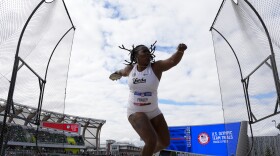The women’s is underway in Greensboro, and three North Carolina teams are left: Wake Forest, NC State and Duke. Years of dedication from young female athletes culminate in tournaments like this, but despite the athleticism and dedication of the players, fans do not come out in droves like they do for men’s games. So, what does that mean for the athletes, their financial potential and the game at large?
Host Frank Stasio previews the tournament and talks about women’s basketball history with a WNBA All Star and a women’s basketball historian. , an assistant coach for the Loyola University-Maryland women’s basketball team, shares stories from her time playing at NC State and her journey to being inducted into the North Carolina Sports Hall of Fame in 2017. Historian talks about the book she co-authored: “.” (UNC Press / 2017)

Interview Highlights:
Grundy on why women in rural and African American communities played basketball from the 1920s-1950s:
Middle class women subscribed to this ideology that women are supposed to be very different from men. They're supposed to be more moral. They're supposed to be protected in the home and the private realm, and so then that really bleeds over into that women should only play intramural sports. They shouldn't be too rough. They might get hurt — those kinds of things. Whereas you get these rural communities [where] women work in the textile mills. No one worries the same way about women getting hurt. Same with African American communities, you know, African American women always worked. So there's not the same restrictive idea of what a lady should be that you get in these middle class, white, often urban communities.
Grundy on the cultural appreciation for male athleticism vs. female athleticism:
I think there's an understanding that women can play sports and that women should be allowed to play sport, but it doesn't produce the same level of enthusiasm broadly that men playing sports do. It's still kind of a niche thing. And as you noted, the crowds are growing, people are learning to appreciate [women’s sports], but they're not what the men's crowds are. People don't get as excited on a broad sense to see women play.
Melvin on her family’s reaction to her passion for basketball:
But it became a challenge at home playing because of my mother. It was a rural town, so I was supposed to play with the girls, and girls are supposed to be in there learning how to cook. I didn't really do that. And so what happened was I went outside and played with my cousins because they were always playing basketball. But [my boy cousins] wouldn't let me play. So I went to my grandmother, who was like the [head of the] hierarchy in our small town. And I said: They won't let me play. So she went out there. And she said: Son, does everyone eat around here? And everybody's like: Yes. And she was like: Okay, well, if Chasity can't play, then no one will eat, and Chasity will eat. Then I had no more problems.
Melvin on how coaching an NBA team forced her to confront her internalized bias…and then prove it wrong:
I didn't have a dream of coaching men or coaching in the NBA, because I just never saw it as a reality. I just wanted to coach, and I felt like coaching women's basketball was just as successful as coaching men. And I didn't see women in those roles of head coach coaching me and or even as assistant coaches. Then I got in the [NBA coaching] program, and I worked my butt off, and I had an opportunity to [coach] with the Greensboro Swarm. … I had so many expectations like: Oh my god, these are men. They’re playing. And subconsciously, you don't really realize it, but it's like, men's basketball has to be better. It has to be harder. It has to be more difficult. Even though I had played pro for almost 14 years, I still had that mindset. So when I actually coached men, I'm like: Oh, it's just basketball.














